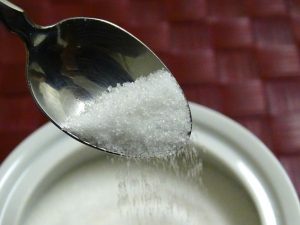If there is one New Year’s resolution that we should all make is, drastically reduce the amount of sugar we have in our diet. Why ?…. because it is strongly linked with causing cancer. Shockingly this was discovered in a study nearly 50 years ago – but since the research was funded by the sugar industry the results were never published.
Most of us enjoy a sweet treat, but many are addicted to the taste of sugar. Sugar has been linked to the development of diabetes and heart disease. In 2016 a study on mice linked high sugar intake with an increased risk of breast cancer. Previous studies have highlighted an increased risk of endometrial cancer in women and colon cancer in men, although clear cut evidence is still forthcoming.
 Sugar is everywhere!. Increasingly hidden sugars are a problem. From dried fruits to fruit juice. Clearly, too much sugar is not good for our health but the challenge is how to avoid it. This is especially difficult for those who have a ‘sweet tooth’ and find it hard to abstain. It is essential that the body maintains blood sugar levels within an acceptable range. When it falls too low the energy supply to the tissues is compromised.
Sugar is everywhere!. Increasingly hidden sugars are a problem. From dried fruits to fruit juice. Clearly, too much sugar is not good for our health but the challenge is how to avoid it. This is especially difficult for those who have a ‘sweet tooth’ and find it hard to abstain. It is essential that the body maintains blood sugar levels within an acceptable range. When it falls too low the energy supply to the tissues is compromised.
Sucrose and fructose, both constituents of table sugar are thought to change cell metabolism and increase cancer activity. Researchers from VIB and Vrije University in Brussels most recently discovered that a compound found in sugar stimulates aggressive cancer cells helping them to grow faster. This research reaffirms the Warburg hypothesis based on the Warburg effect. The Warburg effect explains that sugar is rapidly broken down by cancer cells as fuel for growth. The reason for the rapid breakdown is because cancer cells are fast growing and therefore greater energy needs. Levels of sugar intake is much higher than healthy cells, and results in the production of lactic acid During the sugar breakdown reaction an intermediate compound is produced which directly activates Ras (a cancer causing protein). The researchers identified a vicious cycle where the Ras protein in turn stimulates sugar breakdown.
This direct link between sugar and the aggressiveness of cancer should not be ignored. However, it does not mean that eliminating dietary sugar will make you cancer free but it will improve chances of a more successful cancer treatment.
Reducing the consumption of sugar as a New Year resolution can be a turning point for improving your health. You cannot control sugars already contained in fruits and vegetables, but you can choose to reduce how much sugar you put in your tea or coffee. Most processed foods will contain sugar. There is more sugar in pre-packaged foods than you think. Always read the label !
